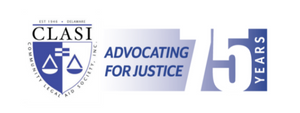The Health Resources and Services Administration (HRSA) of the Department of Health and Human Services has awarded CLASI the 2013 Federal TBI Program Award for TBI Advocacy. This award recognizes a Protection and Advocacy System that successfully advocates for an individual with TBI, or, that advocated to set a precedent or impact policy or legislative changes in the State.
In its award notification, HRSA cited the following specific examples of the DLP’s exceptional advocacy efforts:
- CLASI assisted a forty-nine year old woman who was injured in car crash that resulted in TBI and spinal cord injury. She used a wheelchair and was assisted by a service dog for both retrieval and blackout intervention. Security guards in a retail store approached her and demanded that she leave because there were “no dogs allowed, unless seeing-eye dog.” Management was not persuaded by her description of service dog. Management proceeded to call the police, who told her to leave because she had no “State certification” of the dog as service animal. As there is no “State certification” for service animals, CLASI was able to file an administrative complaint with the Human Relations Commission under the Equal Accommodations law, which was settled for monetary damages and police training.
- The Delaware Department of Education (DOE) published program “physical” examination and screening regulations. Based on their legal expertise, CLASI issued comments which recommended substituting “health examination” for “physical examination” to clarify coverage of mental health impairments, ADHD, depression, and TBI. The comment was shared with the DOE, which agreed with CLASI’s recommendation and adopted a revised final regulation. This is a highly significant achievement, as the forms are completed on behalf of all public school students in Delaware (130,610 during the 2011–2012 school year) and will promote identification of students with TBI.
- CLASI staff served on a committee which provided legally-relevant information on “employment-first” legislation and edited sequential drafts of the proposed legislation. The final legislation (H.B. No. 319) requires all State agencies that provide services to individuals with disabilities consider, as the first option, competitive employment in an integrated setting. The bill was enacted and signed by the Governor on July 16, 2012.
